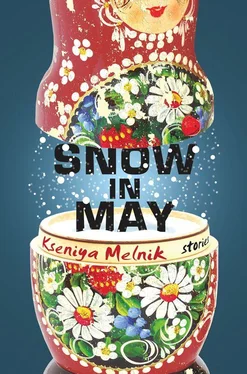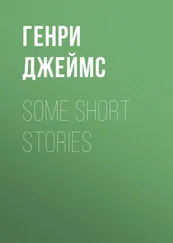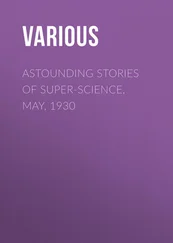Dima felt his nutro overheating, spewing steam. This venture will require sleuthing, breaking into government offices in the middle of the night, stealing documents, reexamining evidence, and reinterviewing eyewitnesses. The shots were fired in the middle of the day, on the steps of the municipal building. The murderer had been hiding in plain sight. Too bad the teachers’ strike was over. He felt bad for the teachers, sure, but free from school, the Avengers would have had so much more time to investigate their first big case. Plus, all the parents and the whole town would have been distracted. Dima remembered the poor teachers, lying on the foldout cots under heavy blankets day and night, haunting the school hallways like ghosts. He had seen his favorite teacher, Rita Pavlovna, faint in the hallway when he came to visit with his classmates, and all he could think of were the funny names of flower parts she’d taught in Nature Studies just a week prior. Pistil, stigma, ovary. Stamen, sepal, peduncle. Now he felt ashamed. Some hero he was, wanting to be on TV, and wishing such terrible things on the teachers.
Then it dawned on him: he was on TV. Now. And his legs were itching like crazy.
He stopped again. The audience began to buzz even before the producer yelled “Cut!”
The cameraman closest to Dima stood up. “Enough time to get a smoke?” he said.
Again Anna Glebovna was upon Dima, her heaving neck covered with red spots.
“Maybe someone else could play first and then we let Ushakov try again?” one of the parents piped up.
“My students can go first,” said another teacher from the arts college. Dima knew Faina Grigorievna didn’t like him either. He, too, was a hack. “They have their pieces drilled down to the last note. We’ve got all the dolls, ‘Sick Doll,’ ‘Doll’s Funeral,’ and ‘New Doll.’ We’ll be quick.”
Full-voiced conversations sprang up throughout the audience. The producer milled in front of the lights panel, looking at his clipboard.
“My daughter practiced very hard,” cried out one of the mothers. “We have a doctor’s appointment later in the afternoon. We can’t be here all day.”
Tik tik tik tik tik … 12:12 already. The plate-faced clock smirked at Dima with its unnatural brow.
“Silence! Silence in the studio,” the producer said. “Maybe we should call his mother? Or his teacher? Where are they?”
“Futile,” Anna Glebovna said and looked at Dima as if she were about to bite his head off.
He imagined his mother being dragged away from her chair and onto the stage, under the projector lights. He had never seen her speak in public; he’d never seen her do anything in public. Poor, poor Mama.
Something salty began to pop in his nose. He wasn’t going to cry now, was he? His stomach gurgled. His mother had cooked him a special Tchaikovsky Festival breakfast this morning. They didn’t eat eggs often, and he couldn’t remember the last time they’d had meat. For months now his mother was paid in barter with cafeteria food, which — he had to admit — tasted considerably better at home. But this morning she had conjured a warrior’s meal. Two sausages were the sturdy cannons, pink-rusted from their heroic participation in the Napoleonic Wars, also the Great Patriotic War, and the American Revolution. The peas were the cannonballs. If Dima asked for the whole jar, he would get at least half — there was no such thing as too much ammunition. The two eggs, sunny-side up, were enemies, which, once pierced by the five-pronged lance, spilled their blood all over the battlefield, showing everyone that no enemy blood would be spared in the fight for … against the fascists. Yes, the fascists! Their blood was yellow like poison. Tadadadadadadada pshaw, tatatadadadadadada pshaw poohhweeea!
“We should call someone,” the producer said. “Ushakov! Ushakov? Somebody do something.”
Stop, stop, stop! Dima pleaded with himself. He stuck his head into his hands. Whose idea was piano anyway? His mother’s, who else’s. And what for? Nothing heroic came of it, and everyone only suffered. When Dima struggled, squished flat under Faina Grigorievna’s teaching, his mother would get a worry flu. When he did well, he would sometimes notice a blink of suspicion and fear in her eyes. Once, he caught her sitting at the piano at home, with her elbows on the keyboard cover, her eyes closed. She sat like that for a while. He was going to ask her whether everything was all right, but the silence in the room was like the silence after the orchestra conductor had raised his baton. Thick with the future, or the past. Uninterruptible. So he closed the door and tiptoed to the kitchen.
It was too late now to uncoil the chains of fate. Dima was handcuffed to the piano, sinking down down down, through the floors of the studio and into the dark catacombs under the city, where the old Kolyma gold was buried.
Eureka! The Uncatchable Avengers will find the legendary treasure guarded by the ghosts of the first prospector, Bilibin, and the ten helpers he killed to keep the gold all to himself. Genka can’t disagree with a plan like this; he can even keep some of the gold. The rest — chests upon chests of it — they will distribute equally among the people of the town. His mother will be happy. She will finally buy a new winter coat and beef to make her famous “snowstorm stew.” He will give some gold to Faina Grigorievna, too, so she could visit her family in Germany. The Avengers will give some of the gold to the school so the teachers never have to go hungry again. Well, only if they wanted to. He felt warmth spreading from his nutro to the rest of his body. His ears rang with distant music. Cymbals and timpani. He will hire private detectives from Moscow or London (like Sherlock Holmes!) to find the mayor’s killer. A hundred buzzing violins and violas were circling in on him like a swarm of bees. He will buy mountains of coal. He will melt the city so that spring and summer would come early and stay. Or not stay: he loved playing hockey with Genka in the winter, too. He began to rock, like he’d seen the pianists do at the concerts on TV, their hands springing about in gymnastic contortions. He’d been embarrassed for them before.
Without a doubt, his inability to play his piece through was more than a problem of concentration. Under the bright projector lights and the stares of the audience and the camera, the soldiers marching through the field were amplified to the size of the world. It clogged his still-young nutro . To play the simple march, he had to forget all about the Uncatchable Avengers, the murdered mayor, the hungry teachers, the Kolyma gold, and his poor mama. Or play another piece — a virtuoso concerto with full symphonic orchestra. He could already hear the way such fortes and such pianos could sound, as if the instrument were made not of wood and metal but of something alive and breathing. He wasn’t good enough of a pianist yet.
“This is your last chance,” Anna Glebovna growled. Some of the parents were still talking. The children, however, were quiet. They knew that no matter how much they’d practiced, Dima’s fate could befall them all.
“You are embarrassing Magadan’s entire musical community, Ushakov,” she continued. “Your so-called gifted program as well as my music school. This is unacceptable. Any fool with half a mind can play this march. Don’t play it well. Just play to the end, for God’s sake. I don’t know how else to tell you.”
“Are we ready?” the producer said. He had taken off his corduroy jacket. His face was red, his mustache twitchy. “Last take, then we’re moving on to the next participant. Audience, return your chairs to their original places and be ready for the camera. Pleasant faces, content faces. Art is the beauty of life, et cetera. Crew, stand by.”
Читать дальше
Конец ознакомительного отрывка
Купить книгу












